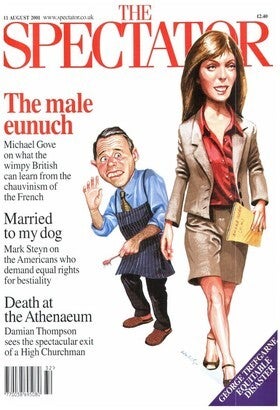
Michael Gove wrote an article arguing British men had been subject to a "collective cuckolding" and should learn to embrace male chauvinism in a story headlined ‘The male eunuch’.
Mr Gove's 2001 piece was published by then-Spectator editor Boris Johnson, who gave it front-cover billing under the title: "The male eunuch – what the wimpy British can learn from the chauvinism of the French".
The 33-year-old Mr Gove, who would soon become a Tory MP at the next election, complained that British men were increasingly found doing jobs like "changing nappies", which he said affected their "dignity and prestige in the eyes of others".
Women's charities and opposition figures have urged the pair to apologise and disassociate themselves from the article's "blatant sexism" and "damaging narrative" – which they say drives violence.
The revelation comes after a week of focus on misogyny in Westminster, with reports 56 MPs including three cabinet ministers are facing sexual misconduct allegations, an investigation into a male MP watching pornography at work, and outrage over sexist political coverage.
In the 2001 piece, along with an illustration that featured a cartoon of a terrified man doing housework and cowering while a women strides off to work, Mr Gove argued:
"It is a fact of human nature that male attractiveness is generally linked to the man's capacity to provide and the maintenance of his sense of self-worth. The feckless or jobless male makes an unproductive, and unattractive, partner.
He continued: "The male compelled to work in a field which compromises his masculinity, in his own eyes and those of his peers, feels, and is, less of a catch for any woman.
"These are harsh truths, and one might wish we lived in a gentler world. But the effect of men robbed of their masculinity shows up in these divorce statistics."
The Independent has previously revealed Mr Gove’s past use of homophobic slurs and racist jokes. Mr Gove made a string of off-colour remarks during Cambridge University debates in the 1990s, which included calling people living in countries colonised by Britain “fuzzy-wuzzies”.
In his Spectator piece, the senior Tory argued that government policy should "nurture and support the traditional male breadwinner" and praised the French for having protected the "social, cultural and economic position of the paterfamilias", or head of the family.
"The French have, like the original indomitable Gaul, Asterix, defied forces others thought overwhelming by recourse to a potent elixir of masculinity and patriotism. They have, to be blunt, drawn strength from their chauvinisme," he said.
"In France, the protected position of the middle-aged, semi-skilled male worker makes him an attractive partner, worth retaining.
"He is more likely to have a steady income with which to provide for the raising of a family, and he is more likely to be engaged in the type of labour that maintains his dignity and prestige in the eyes of others.
"He is, to be blunt, less likely than his British counterpart to be employed flipping hamburgers, wearing a security guard's uniform or changing nappies."

Ruth Davison, CEO of women's charity Refuge, told The Independent the language in the article "bears all the hallmarks of misogyny from a bygone era that privileges male dominance over women in the family, and society at large".
“It is widely acknowledged that there are huge parallels between these ideas around the familial patriarch and women’s oppression. And we know that misogyny causes violence against women and girls all over the world," she continued.
“If members of the government perpetuate damaging narratives and gender stereotypes, how can we trust them to tackle violence against women and girls?
“The government must do better by victims of gender-based violence and disassociate itself from these damaging comments, no matter how long ago they were. Any refusal to do so would just add insult to injury given how recently the government rejected calls from across the sector to add misogyny to our existing hate crime legislation.”
A spokesperson for Mr Gove did not respond to requests for comment by The Independent ahead of publication.
Earlier in the spring ministers rejected proposed amendments to their police bill that would make misogyny a hate crime in England and Wales. Mr Johnson said there was already "abundant statute" on the books to deal with such crimes while Home Secretary Priti Patel argued the idea could be "more harmful than helpful".
On Tuesday, asked whether he regretted his attitude towards women, Mr Johnson told Times Radio: “I’m sure every human being looks back over episodes in their lives and wonders if might have done things differently.”
Wera Hobhouse, women and equalities spokesperson for the Liberal Democrats said: “The blatant sexism this article embodies is sadly still something which pervades our politics today.
“We should hold our elected politicians to a higher standard than this. Both Boris Johnson and Michael Gove should apologise for ever promoting these biased views and commit to taking real action to end the culture which still holds women and girls back from equal chances. Liberal Democrats will continue to fight sexism in all its forms and fight to make misogyny a hate crime.”
Opposition MPs on Monday demanded answers from Mr Johnson over claims that one of the lockdown-breaking No 10 parties featured a "sexist of the year" award. On Friday Cabinet minister Anne-Marie Trevelyan spoke out about how a male MP had "pinned" her against the wall – and called on other MPs to “keep your hands in your pockets”.
Mr Johnson edited the Spectator from 1999 to 2005, and was elected as an MP in 2001. The latest article unearthed by The Independent is among a number of controversial pieces published and penned by Mr Johnson in his time as a top journalist.
In one 2002 article, reported by The Independent in 2020, the then Tory MP said colonialism in Africa should never have ended and downplayed Britain’s role in the slave trade. The PM also published a novel in 2004 titled Seventy Two Virgins which featured racist and sexist passages.







